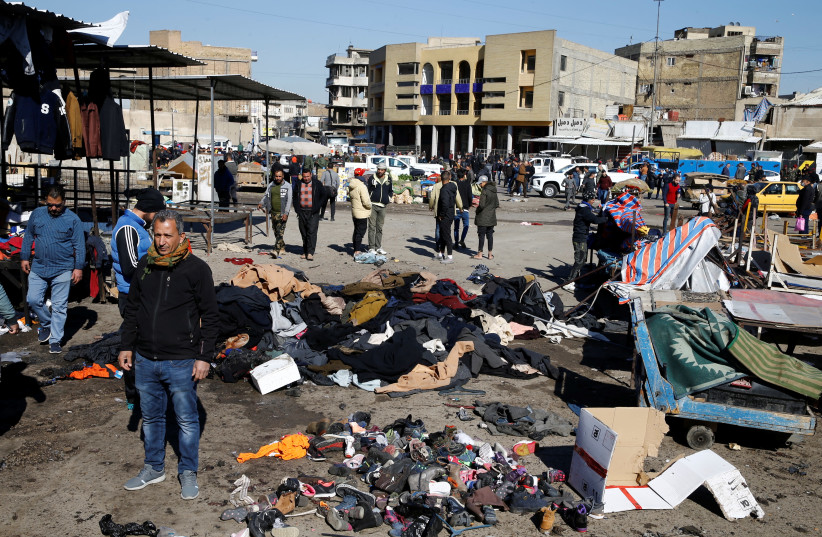Baghdad bombing could be the Biden admin's first challenge
The bombing was only four kilometers
from the US embassy compound and occurred in an area where there have
been protests over the last year and a half.
By Seth J. Frantzman, Jerusalem Post, January 22, 2021
The site of a twin suicide bombing attack in a central market is seen in Baghdad (photo credit: REUTERS)
A twin suicide bombing in Baghdad’s
Tayaran square, packed with people shopping, left two dozen dead on
Thursday afternoon, in the most deadly attack in more than 18 months,
local reports said, recalling past years when suicide bombings like this
were routine in Iraq. Islamic State perpetrated many attacks and while
it is not known if this was an ISIS attack, it has its hallmarks.
The
bombing, four kilometers from the US embassy compound, occurred in an
area which has witnessed several mass protests over the last year and a
half. In the fall of 2019 protesters often besieged security forces on
Al Jumhuriya bridge, not far from the market where the bombings took
place.
Online video appeared to capture the second of the two reported
explosions in which up to 100 were reported wounded, near the “Bab
al-Sharqi” area of central Baghdad.
There
have been increasing threats and low-level attacks on convoys that
supply the US in Iraq. Last year dozens of attacks with 107mm rockets
were fired at the US embassy compound and at US forces in Iraq. The US
has drawn down most of its troops, leaving only several thousand
personnel, many of whom have been relocated to the autonomous Kurdistan
region which is more sympathetic to the US.
In
other areas of Iraq the pro-Iranian militias of the Popular
Mobilization Units run checkpoints and have threatened the US. These
groups include the Badr Organization, Kataib Hezbollah, Asaib Ahl al-Haq
and Harakat Hezbollah al Nujaba. The day before the attack in Baghdad
there were reports of an attack on a convoy carrying equipment to the
US-led anti-ISIS Coalition.
The
attacks carried out by pro-Iranian groups are often precise and use
107mm rockets. ISIS-style attacks use suicide bombers to kill civilians.
Pro-Iranian groups are often more tactical and strategic in their
killing, targeting foreigners or journalists or translators, but not
randomly blowing up shoppers.
A
source told Al-Ain Al-Akhbariya that “a suicide bomber wearing an
explosive belt blew himself up at Tayaran Square in the Bab Al-Sharqi
area, followed by the detonation of another suicide bomber meters away
from the place of the first explosion.” It appears the use of two
bombers was to draw in people after the first explosion and then target
the onlookers. This is also a typical tactic of ISIS-style attacks.
The suicide bombing occurred in the same place, which is often crowded
with pedestrians in Tayaran Square, killing 31 people 3 years ago,
Al-Ain said. The attack could present the Biden administration with one
of its first foreign crises. The US left Iraq in 2011 but then returned
in 2014 at the invitation of the Iraqi government to help lead a
coalition against ISIS. The US has trained and mentored around 250,000
Iraqi troops with the support of dozens of members of the coalition.
These include European countries. The US is also supporting training and
equipping of the Kurdish Peshmerga in northern Iraq. When US-Iran
tensions rose in 2019 and early 2020, and the US killed Iranian IRGC
head Qasem Soleimani in Baghdad, many foreign advisers left. The
Covid-19 virus has also reduced training.
The bombing provides US President Joe Biden
with an early opportunity to show US support for Iraq. Biden has said
that the US is “back” and the world can expect the US to care again
about foreign policy and work multilaterally to solve problems. Iraq is a
very complex problem. The pro-Iranian groups want the US to leave.
Groups like Ashab Kahf and others linked to Iran are threatening people
who work as interpreters, for instance, according to a tweet by the
BBC’s Nafiseh Kohnavard.
Iraqi
President Barham Salih said that “two terrorist explosions against the
safe citizens of Baghdad, at this time, confirms the endeavor of dark
groups to target the great national needs.” He said that the people of
Iraq aspire to a peaceful future, we stand firmly against these rogue
attempts to destabilize our country. We ask God to provide mercy to the
victims and to heal the wounded.”
At
the same time the US-led coalition continues to highlight successes in
Iraq. It says that over the past year, 360,696 square meters of land
have been cleared of mines and explosives. “Some 7,300 explosives parts
and devices, and 1,172 mines have been extracted by our agency,” said
Jabar Mustafa, head of the Kurdistan Region’s Mine Action Agency
(IKMAA). The old Erbil-Kirkuk road, connecting the town of Qushtapa with
two nearby refugee camps, was re-opened on January 8.
Coalition
Spokesman Col. Wayne Marotto said that it sends “our condolences to
those affected by the attack in Baghdad today. This is yet another
instance of terrorists killing fellow Iraqis & harms those who seek
peace.” The recently appointed Middle East coordinator for policy under
Biden, Brett McGurk, was a former envoy for the US-led Coalition against
ISIS. An expert on Iraq, he will take a keen interest in addressing the
issues in the wake of the bombing.
There
are other tensions as well. On January 18 pro-Iranian groups claimed a
mysterious airstrike targeted their weapons warehouse at Jurf al-Sakhar,
40 miles outside of Baghdad. In fact it appears that the incident was
also an ISIS attack.
This page was posted by Sputnik One of the Sputniks Orbit blog
Please Recommend this page and follow us at:
















